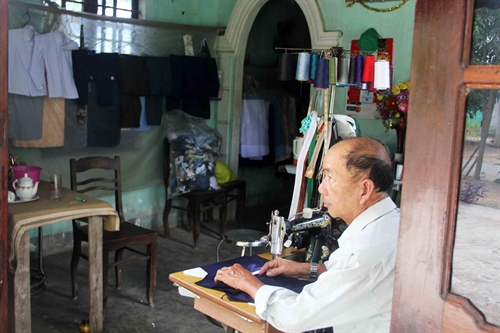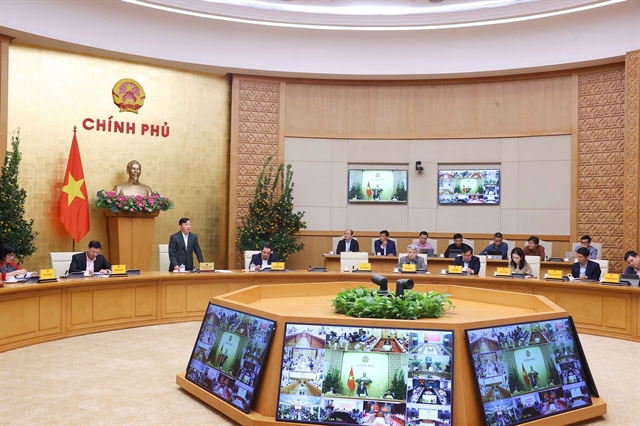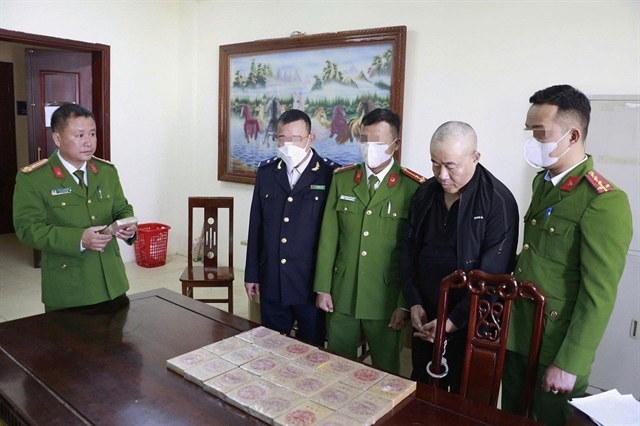 Society
Society

Hồ Văn Hiệp, a resident of central Thừa Thiên-Huế Province, sits looking at the sun beams piercing the roof of his home and wishing his compensation payment would come soon so that he can repair the broken roof before the rainy season.
 |
| Hồ Văn Hiệp returned to tailoring after 30 years in order to make a bare living. — VNS Photo Phước Bửu |
Phước Bửu
THỪA THIÊN - HUẾ — Hồ Văn Hiệp, a resident of central Thừa Thiên-Huế Province, sits looking at the sun beams piercing the roof of his home and wishing his compensation payment would come soon so that he can repair the broken roof before the rainy season.
At 77, Hiệp is not strong enough to do much other than tailoring at home and making an unstable, humble income. He has been awaiting the compensation for almost 12 years.
“I am too weak now to work harder and make more income. The only source that I could expect is the compensation but they have delayed for years,” Hiệp said.
He is among 53 families in the province’s Hương Thủy District that gave their forest land for construction of the Tả Trạch power plant’s reservoir in 2004. At the time, the provincial People’s Committee coordinated the site clearance and compensation payments to the land owners that had already been paid by the investor Bitexco.
Almost 245 households, including the 53 families that owned forest land, were evacuated from the village and relocated to a remote hilly area in Phú Lộc District. In 2012, all but two received plots half the size of the ones they owned before, to build new homes.
The committee pledged, on paper and orally at meetings with those families, that it would compensate them for the other half of the plot as soon as it gets a source of additional land.
Land means planting industrial trees that produce incomes for those families. Delays in compensation have resulted in hard times for them, and they have had enough. They are filing a lawsuit over the delayed compensation.
But Hiệp seems to be luckier than others, including Nguyễn Thị Chót and Trương Ky, who got no land compensation at all although their families had forest land for production in their home village.
Chót was told that she had not been included in the list of 53 families that got land compensation in 2012 due to a clerical error. Following her petitions requesting recitfication of the mistake, in 2013 the province’s Department of Agriculture and Rural Development issued a document saying Chót would receive land compensation or an equivalent sum of money, but she was asked to wait until they could find a source of land for her.
At 80, her patience is spent. She has written petitions to ask the province’s People’s Committee to speed up her compensation.
“I will die soon and the authorities must be in rush. I have handed tens of [handwriting] petitions to the committee but they keep promising,” Chót said.
In recent years Chót wanders around collecting dry wood and selling it to make money to hire motorbike taxis to Huế City, 80kms away, to file her petitions with local authorities.
“I don’t know why they are reluctant to pay me. The land area is my property and I deserve to get it back. I spent years to reclaim the virgin soil, with my sweat and tears."
Chót said her husband and her first son had died and she was the only one who cleared the bushed for years to reclaim almost 2ha land in her home village.
Meanwhile, Trương Ky, 57, was compensated with a land plot owned by another farmer. The situation has turned his family from a middle income (by Vietnamese standards) to a lower income household.
“They moved me here, giving land for building a house and a garden. But the soil is too hard for growing vegetables or fruit trees,” Ky said, adding that he and his wife are barely making a living by collecting dry wood.
Đặng Duy Bửu, the village head at the relocation area where Hiệp, Chót and Ky live, confirmed the facts, saying life for those 53 families had been turned upside down since the day they were removed from their home villages in 2004.
Hiệp, Chót, Ky and the others had homes, gardens and forest land for the production of industrial trees, yielding sound incomes. Now, in the relocation area, they can hardly feed themselves by growing food on the hard soil of their gardens.
Hiệp went back to tailoring, work he had given up some 30 years ago. Chót is ageing and getting weaker daily but has no money for hospital.
The village head Bửu himself owned a herd of 100 cows, 25 buffalo and a few goats in his home village. Those could have made him a Vietnamese đồng billionaire. He said life in their home village was good before the investor came.
“To some extent, I have a sound life here. Those suffering most are people like Chót and Hiệp. The authorities should think of a possible way to compensate them before they die,” he said.
According to the local Centre for Social Research and Development, which is helping the community file its lawsuit demanding quicker compensation, the investor had fulfilled his part of the deal and the problem was the responsibility of local authorities.
Media in the province have raised the question of responsibility and of civil servants’ ethics code in this case. But Phan Ngọc Thọ, deputy chairman of the People’s Committee, told the media months ago that the province had run out of land for compensation.
Việt Nam News contacted local authorities continuously for two weeks, but they have not given a direct answer on the issue.
Hiệp and Chót are seemingly helpless. Even those expected to help them sound their voice, like the media, cannot ease their difficult life and shorten their long wait. — VNS




